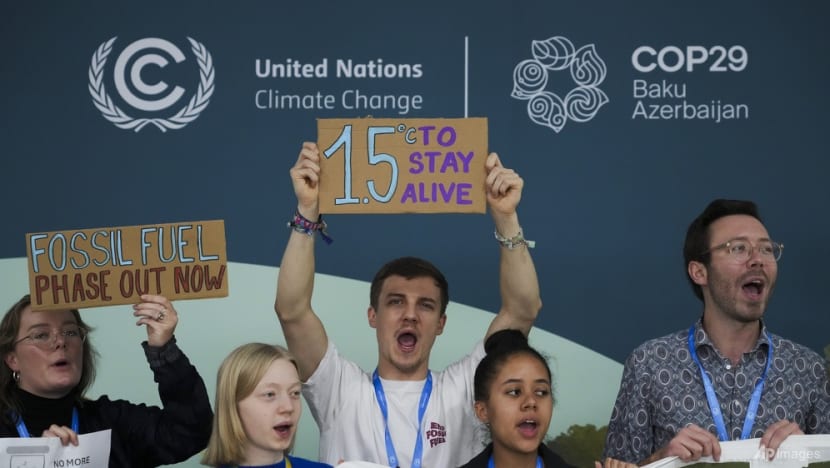Commentary: Ten years after Paris Agreement, climate action faces a reckoning
There is growing recognition that a nation’s climate ambition can no longer be assessed solely by the strength of its political declarations, says Li Shuo from the Asia Society Policy Institute.

Activists participate in a demonstration for phasing out fossil fuels at the COP29 UN Climate Summit, Nov 19, 2024, in Baku, Azerbaijan. (AP Photo/Sergei Grits, File)

This audio is generated by an AI tool.
WASHINGTON DC: Ten years on from the landmark Paris Agreement on climate change, 2025 could have been a fitting anniversary – with countries updating their Nationally Determined Contributions (NDCs) and setting out 2035 emission targets.
Instead, 2025 has proven a difficult year for climate ambition. Trade disputes, energy security concerns and the resurgence of nationalist politics have distracted major economies from climate commitments. United States President Donald Trump has not just actively rolled back climate policies but has now threatened tariffs against countries that support an international agreement for a carbon tax on shipping emissions.
At an upcoming United Nations climate summit on Sep 24, key countries are expected to outline their 2035 emissions targets that will help set the floor for international ambition over the next decade. However, it will also spotlight a sobering reality: The scale of effort required to keep global warming in check remains immense, while political willingness to meet that challenge appears unprecedentedly strained.
Against this backdrop, the upcoming United Nations General Assembly (UNGA) in September will be a critical moment of reckoning.
Developments in the world’s three most consequential economies – the United States, European Union and China – offer a window into shared political challenges and diverging capacities to sustain long-term progress, depending on their ability to align climate goals with economic strategy in this new phase of global climate action.
AMERICAN U-TURN AND EU STRAIN
In the US, Mr Trump has overseen a dramatic U-turn of predecessor Joe Biden’s climate policy at home and severely eroded American credibility in international climate negotiations.
His administration has dismantled clean energy incentives, injected severe uncertainties to the clean energy market and rolled back regulations – from challenging the fundamental legal basis of regulating carbon emissions to de-funding federal agencies critical to addressing the climate challenge.
Internationally, the US has also withdrawn from climate diplomacy forums and will slash funding for multilateral climate efforts.
Across the Atlantic, climate policy in the European Union appears far more stable. Yet, under the strain of security challenges and a persistent rightward political shift, even this historical climate frontrunner faces mounting headwinds.
While the overarching framework of the European Green Deal – the bloc’s flagship climate initiative – remains, several of its core elements have been softened.
These include the weakening of corporate sustainability obligations, delays to methane control measures and the loosening of vehicle emissions standards. Under the banner of “bureaucratic simplification”, further retreats are unfolding in areas such as deforestation, biodiversity protection and sustainable finance.
Europe’s increasing focus on industrial competitiveness, particularly in response to previous US subsidies and China’s dominance in clean tech, could strengthen homegrown industrial champions. But this also risks fueling protectionism, raising transition costs and, ultimately, slowing climate action.
MODEST POLITICAL WILL BUT RISING COMMERCIAL POWER IN CHINA
For some time, there was hope that China would emerge as a proactive international climate voice, even if it would not or could not fill the space vacated by the US. That prospect remains distant.
China’s climate discourse resembles the EU in reverse: The country’s vast industrial might has clearly outgrown its leadership’s political appetite.
Fuelled by an abundant and affordable renewable energy supply as a result of a decade-long industrial campaign, solar and wind installations in 2025 alone are projected to reach an astonishing 500 gigawatts, surpassing the entire US installation capacity. On the roads, every second new car sold now is electric. Clean tech firms are rapidly expanding overseas too, gaining momentum in Global South markets.
Yet, despite this economic dynamism, Beijing’s political will on climate remains modest.
In response to an economic slowdown and worsening geopolitical environment, top leaders have dialled back high-profile climate rhetoric and sidelined major emissions targets. The government work report released in March during China’s annual Two Sessions political meeting carried no mention of targets to reduce carbon intensity – downplaying one of its headline commitments under the Paris Agreement.
These national dynamics will inevitably shape the tone and outcomes of climate deliberations at the UNGA.
The US, on its way out of the Paris Agreement, is retreating. Europe remains internally fragmented and uncertain in presenting a unified front in September. China, as the world’s largest carbon emitter, has also hinted in private engagements that its NDC will not align with an emissions trajectory consistent with limiting warming to 1.5 degrees Celsius.
TALKING IS NO LONGER ENOUGH
Already, September 2025 is an extended deadline for countries to submit their updated NDCs. Only 15 of the 195 Paris Agreement signatories did so by the initial February deadline. A clear gap will remain between what countries are willing to commit to and what climate science demands.
Still, there is some cause for cautious hope. There is growing recognition that a nation’s climate ambition can no longer be assessed solely by the strength of its political declarations and this should help guide assessment of the UNGA.
Beyond formal pledges, climate action is increasingly driven by economic forces.
The credibility and impact of climate policy will hinge on how deeply it is embedded in the real economy: through investment flows, industrial strategies, supply chain alignment and trade policies.
Seen through this lens, Beijing seems better-positioned to win the long game.
The 2025 UNGA will not deliver all the answers, but it will highlight the gap between rhetoric and reality. If leaders face this reckoning and back up the talk with economic transformation, it may prove to be less a moment of celebration, and more a sobering but potentially catalytic milestone on the road to a decarbonised future.
Li Shuo is the Director of China Climate Hub at the Asia Society Policy Institute, and a Senior Fellow with its Center for China Analysis.

















